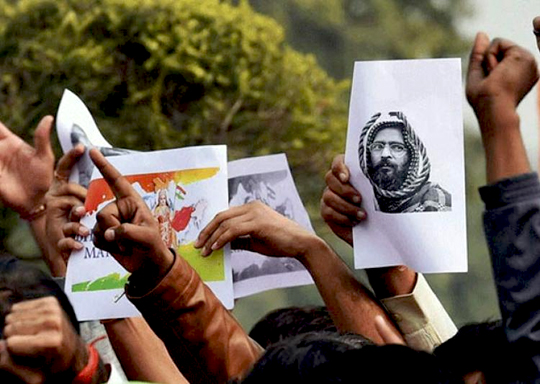New Delhi, Mar 16: Provocative slogans at the controversial February 9 event on JNU campus were raised by a group of outsiders, a high-level inquiry committee of the varsity has said, noting it was "unfortunate" that the students allowed that to happen.

It said holding of the event despite cancellation of permission was an act which amounts to "willful defiance".
The panel has also pointed out lapses on part of the university's security unit, saying it did not make any efforts to stop outsiders from shouting provocative slogans and stop them from leaving the campus.
"The organisers disobeyed the instructions from the administration about not holding the event. This amounts to willful defiance. It is most unfortunate that the organisers allowed the event to be taken over by a group of outsiders who created a charged atmosphere by raising provocative slogans.
"This act by outsiders has brought disrepute to the entire JNU community," the report of the five-member panel said.
"The committee also notes that none of the JNUSU office-bearers acted with due responsibility. The office-bearers had to behave with even more restraint and caution befitting the position they hold.
"They need to rise above the politics and other differences as they represent the student community. It is unbecoming of student representatives that they should be found engaging in disorderly conduct or condoning it," it added.
The report has two sections -- findings and recommendations.
The section of findings has been shared by the university with 21 students who have been issued a show-cause notice in this connection, the recommendations have been kept out of public domain.
Highly-placed sources in the university had said that the panel, which submitted its report on March 11, has recommended rustication of five students including JNU Students' Union president Kanhaiya Kumar, Umar Khalid and Anirban Bhattacharya who are facing sedition charge.
While the panel has identified a few students guilty of procuring permission from the university on false pretext, it has also noted that the Dean of Students (DoS) should have withdrawn the permission in writing and not by sending text message to the Chief Security Officer.
"It has to be noted that since the event had taken place in 2015 as well, the Dean's office was not vigilant enough to anticipate and prevent this event. Security did not make any efforts to stop outsiders from shouting provocative slogans and prevent them from leaving the campus," the report said.
The report also said that the group of outsiders had their heads and faces covered.
A meeting of the university's top brass, chaired by the Vice Chancellor, today discussed the report following which the varsity issued show-cause notice to 21 students including Kanhaiya and Umar, who were found guilty of having violated university rules and discipline norms.
The committee was formed on February 10 to probe the event organised to protest hanging of Afzal Guru, the Parliament attack convict.
Kanhaiya, Umar and Anirban were arrested on charges of sedition in connection with the programme.
Kanhaiya was released on bail from Tihar on March 3 while Umar and Anirban are still in judicial custody.
The university had on March 11 revoked the academic suspension of eight students including Kanhaiya after completion of the probe by the five-member panel. It was decided to keep them under suspension from academic activities till the inquiry was over. However, they were allowed to stay in the hostels.
The panel, which was granted three extensions before it finally submitted its report, also faced difficulties in the probe as students refused to depose before it demanding that the inquiry be constituted afresh.
The varsity, however, turned down the demand and maintained that the students will be given three chances to appear before the disciplinary committee and, if they fail to do so, the panel will finalise its recommendations on the basis of evidence available.
The university authorities maintained that a final decision regarding the "quantum of punishment" will be taken on basis of the reply sent by students to show-cause notices by tomorrow evening.







Comments
Outsiders means
They were Caught hoisting pakistani flag
They were Caught making Bombs
They were Caught instigating the public
They were Caught beating the innocent in patiala
They were Caught Killing their own brothers to hide what get exposed
They were Caught lying to People thru their ZE media
They ARE the real outsider who deal with their EVIL to trouble the innocent & the OPPRESSED.
Y cant the PUBLIC understand this ? Y our intelligence is so WEAK to face this CULPRITS who are troubling our SOCIETY.
FEAR the CREATOR, Not his CREATION>
Add new comment